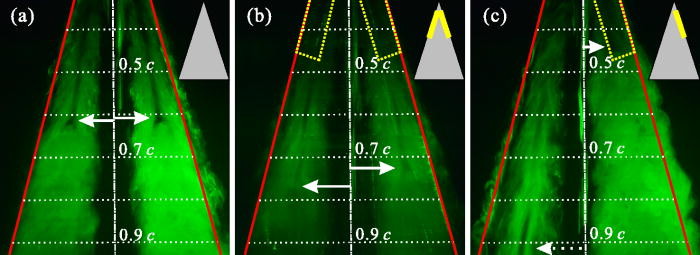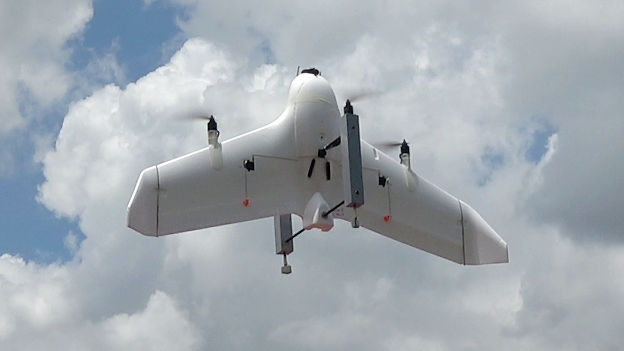Academic Staff


Prof. Chih-Yung WEN
Chair Professor of Aeronautical Engineering, Director of RILA, Director of RCUAS & Associate Director of RISports
- R817
- 3400 2387
- cywen@polyu.edu.hk
Biography
BEng (National Taiwan University); MSc (Caltech, U.S.A.); PhD (Caltech, U.S.A.);
Fellow/ASME (The American Society of Mechanical Engineers)
Fellow/RAeS (Royal Aeronautical Society)
Fellow/HKIE (Hong Kong Institute of Engineers)
Associate Fellow of AIAA
Associate Editor/AIAA Journal
Editor/Shock Waves Journal
Associate Editor/Journal of Advances in Aerodynamics
Research Groups
- Autonomous & Intelligent Robotics Lab: https://gh034.github.io/
- High-speed Thermo-fluid and MAV/UAV Laboratory: https://cywen2024.github.io/
Area of Specialization
Aerothermodynamics and boundary layer transition of hypersonic/supersonic vehicles; Shock/droplet and shock/bubble interactions; Applications of DBD actuators on flow control; Experimental fluid mechanics and CFD; Numerical simulations and assessment of urban wind field and air pollution; Scramjet and Oblique Detonation Engines; Detonation; UAV/MAV technology research and development.
Short Description
Professor Wen received his Bachelor of Science degree from the Department of Mechanical Engineering at the National Taiwan University in 1986 and Master of Science and PhD from the Department of Aeronautics at the California Institute of Technology (Caltech), U.S.A. in 1989 and 1994 respectively. He worked at Caltech as a Research Fellow from February 1994 to July 1994 and then continued his teaching and research works at the Department of Mechanical Engineering at the Da-Yeh University, Taiwan. He was promoted to full professorship in February 2002. He had been the Chairman of the Department of Mechanical and Vehicle Engineering from August 1997 to July 2000, and the Provost from August 2004 to July 2006 in the Da-Yeh University, Taiwan. In August 2006, Professor Wen joined the Department of Aeronautics and Astronautics of the National Cheng Kung University (NCKU), Taiwan, before joining the Department of Mechanical Engineering, The Hong Kong Polytechnic University in 2012 as professor. He served as the associate head/research of ME department from May 2015 to October 2019. He is currently the Chair Professor of Aeronautical Engineering in the Department of Aeronautical and Aviation Engineering, the Director of COMAC-PolyU Research Institute for Large Aircraft, Associate Director of Research Institute for Sports Science and Technology and the Director of Research Centre of Unmanned Autonomous Systems. Professor Wen has authored and co-authored more than 300 scientific papers, conference papers and book chapters. He was also awarded 14 patents. Professor Wen, currently a Fellow of ASME, RAeS, HKIE and an AIAA Associate Fellow, actively engages in professional academic activities related to mechanical and aerospace engineering at both domestic and international levels. In addition, he serves as a member of, various key professional boards and bodies related to the Aerospace Engineering.
溫志湧教授於1986年在國立台灣大學機械工程學系取得工程學士學位,並於1989年及1994年在美國加州理工學院航空工程學系分別取得理學碩士及哲學博士學位。他於1994年2月至7月在美國加州理工學院擔任研究員,其後在台灣大葉大學機械工程學系繼續從事教學及研究工作,並於2002年2月獲取教授席。在大葉大學服務期間,他於1997年8月至2000年7月及2004年8月至2006年7月分別擔任機械與自動化工程學系系主任及教務長。溫教授於2006年8月加入台灣國立成功大學航空太空工程學系,之後,於2012年8月加入香港理工大學機械工程學系。他於2015年5月至2019年8月擔任機械工程學系研究副系主任,現在擔任航空及民航工程學系的航空工程講座教授、中國商飛–香港理工大學大飛機研究院院長、體育科技研究院副院長及無人自主系統研究中心主任。溫教授是超過300篇科學論文、國際學術會議論文集及書籍章節的作者或合著者。他亦成功取得十四項專利。他現為英國皇家航空學會士、 美國機械工程師學會會士、香港工程師學會會士及美國航空太空學會的副院士,他亦積極參與國內外機械及航空航太工程有關的專業學術活動,並擔任多個與航空航太工程有關的專業學會及組織的成員。
Selected Research Project / Teaching & Learning Project
1. High-speed flow researches:
Studies on the fascinating high-speed flow promote the development of super- to hyper-sonic vehicles, such as Supersonic Combustion Ramjet (SCRamjet), aerospace shuttle, as well as various hypersonic vehicles. The research team led by Prof. Chih-Yung Wen at the Department of Mechanical Engineering of the university focuses on a few key elements in this field: 1) the interaction of the detached shock with rain droplet during the reentry of a space shuttle; 2) controlling of boundary layer transition during hypersonic flight; 3) non-equilibrium flow in and out of a hypersonic vehicle where the real-gas effect has to be considered; and 4) interpreting the mechanism of detonation and pursuing its accurate simulation.
Both numerical and experimental platforms have been built and researches are proceeding based on them. The in-house CFD method has shown good performance in capturing shock waves and contact discontinuities in simulating compressible single- and multi-fluid problems and the method itself is under further development. Shock tube with shadowgraph visualization system has produced reliable shock/droplet interaction images which not only validated the numerical simulations but also facilitated other high-speed flow research. A boundary layer transition control strategy is conducted numerically on a Mach 6 flat-plate using heating or cooling strip, where an efficient way to stabilize the hypersonic boundary layer is obtained. Considering the vibrational nonequilibrium effect, a modified steady one-dimensional Zel’dövich-von Neumann-Doring detonation model has been proposed, which confirms its important role played in the detonation cell size change. Via extensive numerical simulation on detonation, the vibrational relaxation in the chemical reaction has also been testified to be a crucial mechanism.
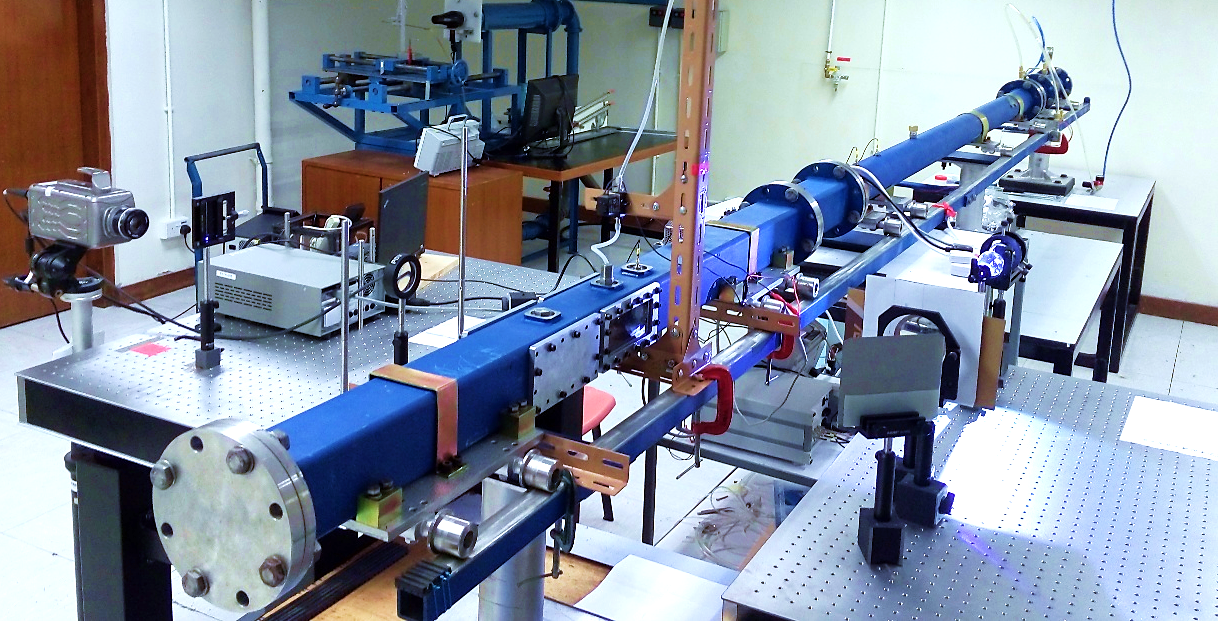
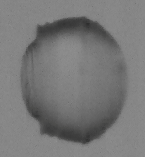
Fig.1 Shock tube facility and high-speed Schlieren image system for shock/droplet interaction research.
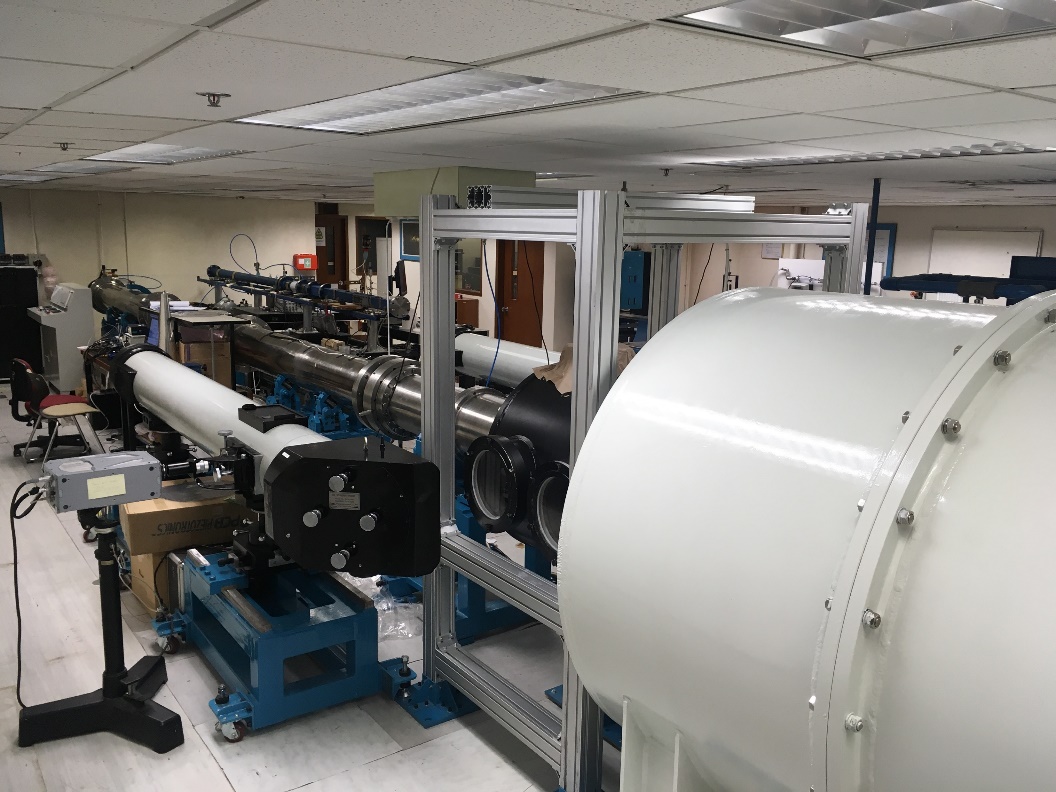
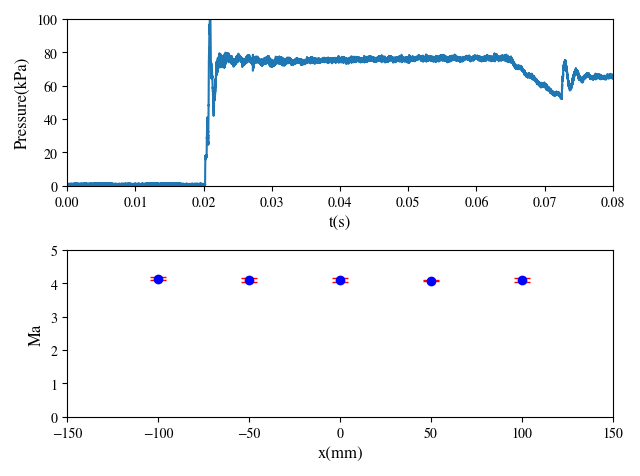
Fig.2 Ludwieg tube facility with SQRT(unit Re = 1.4~3.2 x 10^7 m^(-1)), Ma=4.0 and test time of 40 ms.
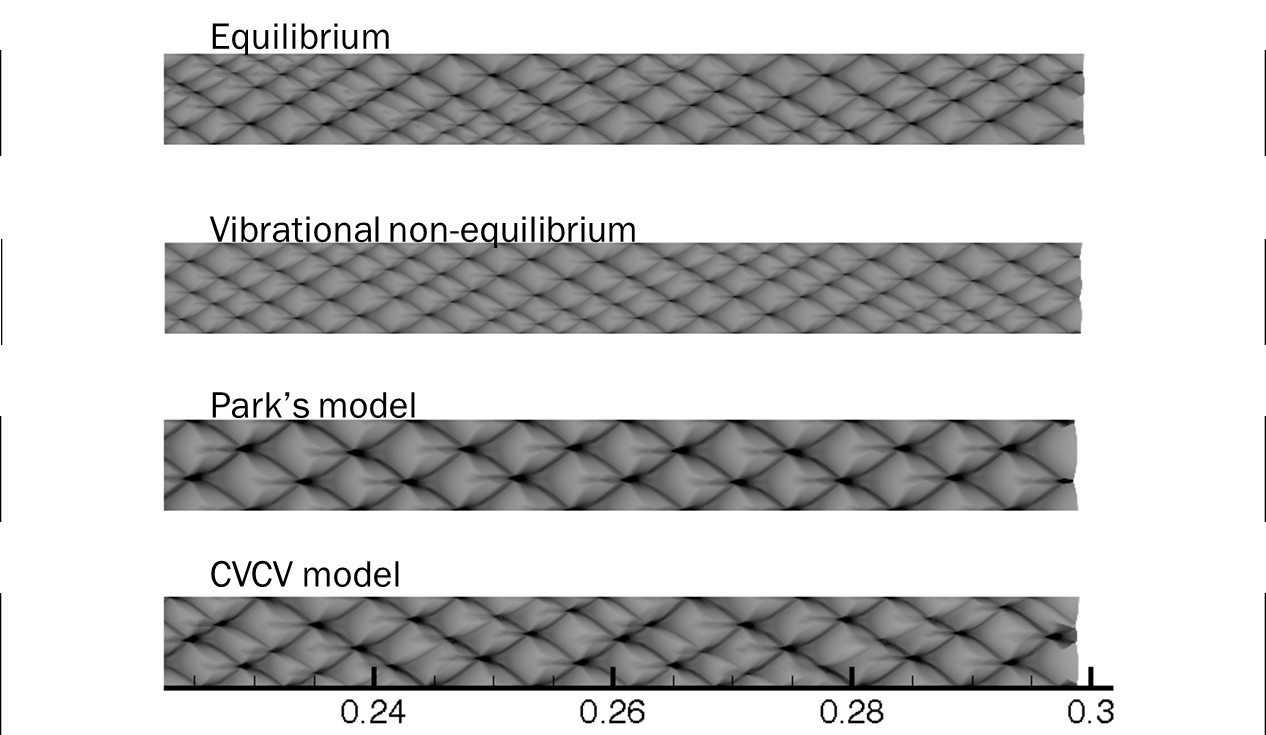
Fig.3 Numerical soot foils using four different vibrational energy/chemical reaction coupling models.
2. Applications of Plasma Actuators:
Plasma actuators have attracted considerable attention in the aerospace industry due to their features of simple mechanism, easy maintenance, low cost and fast response, and they can be formed to various shapes of vehicles. The plasma actuator ionizes the gas molecules and forms the plasma. Electric field induces the motion of plasma and results in the ionic wind which alters the velocity profile inside the boundary layer through the particle collisions and finally changes the aerodynamic characteristics of the vehicle. The research team experimentally investigated the effects of Dielectric Barrier Discharge (DBD) plasma actuators on the aerodynamics of a slender delta wing. The leading edge vortex breakdown locations under both symmetric and asymmetric control forms and various control frequencies are summarized. The aerodynamic response to the controls suggests that the DBD plasma actuator is a promising technique for delta wing maneuvering. More investigations on the delta wing maneuvering will be conducted in the near future.
Fig. 4. Smoke flow visualization results show the typical LEV structure in the transverse cross-section: (a) baseline case; (b) symmetric control case; and (c) asymmetric control (starboard-controlled) case. (α = 36°; Re = 50 000).
3. Unmanned Aerial Vehicle (UAV) and Micro Aerial Vehicle (MAV)
Wilderness search and rescue entails performing a wide-range of work in complex environments and large regions. Given the concerns inherent in large regions due to limited rescue distribution, UAV-based frameworks are a promising platform for providing aerial imaging. The research team led by Prof. Chih-Yung Wen developed an all-in-one camera-based target detection and positioning system and integrated it into a fully autonomous UAV. It is capable of on-board, real-time target identification, post-target identification and location and aerial image collection for further mapping applications. A UAV communication relay solution was also developed by the research team to extend the communication range and bypass obstacles in complex environments. In the application of tail-sitter vertical take-off and landing (TVOL) UAV, a hardware-in-loop simulation environment is established which is capable of real-time dynamic simulation and supports a robot operating system (ROS)-based open-source autopilot. An independent ROS package is well prepared for data communication between a simulator and flight control computer. 2016 Taiwan UAV competition champion is awarded to Prof. Wen’s team. In the MAV field, autonomous control is well realized on a four-wing flapping MAV by which the clap and fling mechanism was proven to play a key role in the lift generation. The understanding of MAV structure and aerodynamics has promoted the designing of flapping MAVs.
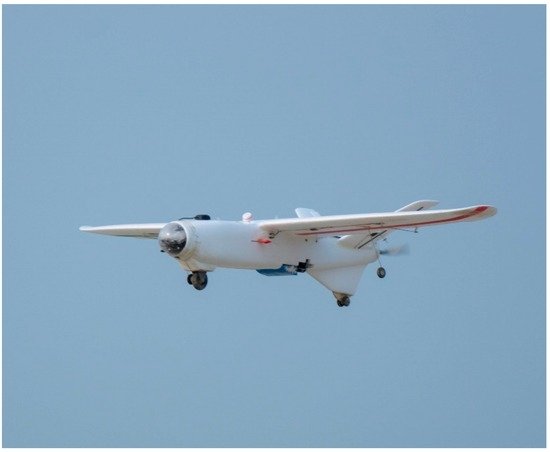
Fig.5 Photos of a fixed-wing UAV and a tail-sitter VTOL
Selected Publications (2012-present, Since joining HKPolyU)
- Zhang, Z.J., Wen, C.Y., Zhang, W.S., Liu, Y.F., and Jiang, Z.L., “Formation of Stabilized Oblique Detonative Waves in a Combustor,” Combustion and Flame, Vol. 223, pp. 423-436, 2021.
https://doi.org/10.1016/j.combustflame.2020.09.034 - Uy, C.K., Shi, L.S., and Wen, C.Y., “Numerical analysis of the vibration-chemistry coupling effect on one-dimensional detonation stability,” Aerospace Science and Technology, accepted, Oct. 30, 2020.
- Jiang, Y.Z. and Wen, C.Y., “On the Conservative Property of Particle-based Fokker–Planck Method for Rarefied Gas Flows,” Physics of Fluids, accepted, Nov. 10, 2020
- Uy, C.K., Shi, L.S., and Wen, C.Y., “Linear stability analysis of one-dimensional detonation coupled with vibrational relaxation, Physics of Fluids, accepted, Nov. 10, 2020.
- Tian, X.D., Wen, C.Y., “Growth Mechanisms of the Second Mode Instability in Hypersonic Boundary Layers,” Journal of Fluid Mechanics, accepted, Oct. 22, 2020.
- Cao, S.B., Jiaao, H., Klioutchnikov, I., Olivier, H., Wen, C.Y., “Unsteady Effects in a Hypersonic Compression Ramp Flow with Laminar Separation,” Journal of Fluid Mechanics, accepted, Oct., 2020.
- Luo, X.S., Liu, L.L., Liang, Y., Ding J.C., Wen, C.Y., “Richtmyer-Meshkov Instability on a Dual-mode Interface,” Journal of Fluid Mechanics, accepted, Sep. 23, 2020
- Hao, J. and Wen, C.Y., “Stabilization of a Two-Dimensional Hypersonic Boundary Layer Using a Shallow Cavity,” AIAA journal, accepted, Sep. 3, 2020.
- Chang, C.W., Chen, S.Y., Wen, C.Y., and Li, B.Y., “An Actuator Allocation Method for a Variable-Pitch Propeller System of Quadrotor-based UAVs,” Sensors, Vol. 20(19), 5651, pp. 1-17, 2020
doi:10.3390/s20195651 - Li, B.Y., Sun, J.X., Zhou, W.F., Wen, C.Y., Low, K.H. and Chen, C.K., “Transition Optimization for a VTOL Tail-sitter UAV,” IEEE/ASME Transactions on Mechatronics, Vol. 25(5), pp. 2534-2545, Oct. 2020.
doi: 10.1109/TMECH.2020.2983255. - Li, Z.T., Zhang, H., Wen, C.Y., Yang, A.S., and Juan, Y.H., “Effects of height-asymmetric street canyon configurations on outdoor air temperature and air quality,” Building and Environment, Vol. 183, 107195, pp. 1-23, 2020.
- Juan, Y-H., Wen, C-Y., Chen, W-Y. and Yang A-S., “Numerical Assessments of Wind Power Potential and Installation Arrangements in Realistic Highly Urbanized Areas,” Renewable & Sustainable Energy Reviews, Vol. 135, 110165, pp. 1-24, 2021.
https://doi.org/10.1016/j.rser.2020.110165
(2019 Impact factor= 12.110, Ranking 4/179 (1.5%) Social Sciences-Geography, Planning and Development) - Jiang, Y.Z., Wen, C.Y.*, and Zhang, D.L., “Space-Time Conservation Element and Solution Element Method and Its Applications,” AIAA journal, accepted, June 16, 2020.
- Shen, L., Chen, Z.N., and Wen C.Y., “Thermal Effect on the Performance of an Alternating-Current Dielectric-Barrier-Discharge Plasma Actuator, " AIAA Journal, Vol. 58, No. 8 (2020), pp. 3368-3377
doi: doi/abs/10.2514/1.J059264 - Li, Z.T., Zhang, H., Wen, C.Y., Yang, A.S., and Juan, Y.H., “Effects of Frontal Area Density on Outdoor Thermal Comfort and Air Quality,” Building and Environment, Vol. 180, 107028, pp. 1-16, Aug., 2020.
- Hao, J. and Wen, C.Y., “Hypersonic Flow over Spherically Blunted Double Cones,” Journal of Fluid Mechanics, Vol. 896, A26, pp. 1-21, Aug. 10, 2020.
- Yang, A.S., Tseng, J.W., Wen, C.Y., and Zhang, H., “Design and Analysis of a Valveless Impedance Pump for a Direct Sodium Borohydride–Hydrogen Peroxide Fuel Cell,” Journal of Electrochemical Energy Conversion and Storage, 17(3): 031009, Aug. 2020.
DOI: https://doi-org.ezproxy.lb.polyu.edu.hk/10.1115/1.4045703 - Shi, L.S., Uy, C.K. and Wen, C.Y.*, “The Re-initiation Mechanism of Detonation Diffraction in a Weakly Unstable Gaseous Mixture,” Journal of Fluid Mechanics, Vol. 895, A24, pp. 1-36, July 25, 2020
- Zhang, Z.J., Wen, C.Y., Liu, Y.F., Zhang, D.L., and Jiang Z.L., “Effects of Different Particle Size Distributions on Aluminum Particle-Air Detonation,” AIAA Journal, Vol. 58 (7), pp. 3115-3128, Jul. 2020.
https://doi.org/10.2514/1.J058237 - Sun, J.X., Li, B.Y., Wen, C.Y., and Chen, C.K., “Model-Aided Wind Estimation Method for a Tail-Sitter Aircraft,” IEEE Transactions on Aerospace and Electronic Systems, Vol. 56, No. 2, pp. 1262-1278, Apr. 2020.
DOI: 10.1109/TAES.2019.2929379 - Chen, S.Y., Chang, C.W., and Wen, C.Y., “Perception in the Dark Development of a ToF Visual Inertial Odometry System,” Sensors, Vol. 20, 1263, pp. 1-26, Feb. 2020
doi:10.3390/s20051263 - Guan, B., Wang, D., Wang, G., Fan, E., and Wen, C.Y., “Numerical Study of the Richtmyer-Meshkov Instability of a Three-Dimensional Minimum-Surface Featured SF6/Air Interface,” Physics of Fluids, Vol. 32, 024108, 2020.
doi: 10.1063/1.5141783 - Zhao, R., Zhang, X.X., and Wen, C.Y.*, “Theoretical Modeling of Porous Coatings with Simple Shapes of Pores for Hypersonic Boundary-Layer Stabilization,” AIAA Journal, Vol. 58(2), pp.981-986, Feb. 2020.
https://doi.org/10.2514/1.J058403 - Liang, Y., Jiang, Y.Z., Wen, C.Y., and Liu, Y., “Interaction of a Planar Shock Wave and a Water Droplet Embedded with a Gas Cavity,” Journal of Fluid Mechanics, Vol. 885, R6, pp.1-13, Feb. 25, 2020.
doi:10.1017/jfm.2019.1031 - Liang, Y., Zhai, Z.G., Luo, X.S., Wen, C.Y.*, “Interfacial Instability at a heavy/light interface induced by rarefaction waves,” Journal of Fluid Mechanics, Vol. 885, A42, pp.1-13, Feb. 25, 2020.
doi:10.1017/jfm.2019.1025 - Liang, Y., Liu, L.L., Zhai, Z.G., Ting, S., Wen, C.Y., “Evolution of Shock-accelerated Heavy Gas Layer,” Journal of Fluid Mechanics, Vol. 886, A7, pp. 1-20, Dec. 05, 2019
doi:10.1017/jfm.2019.1052 - Zhao0F, R., Wen, C.Y.*, Long, T.H., Tian, X.D., Zhou0F, L., and Wu, Y., “Spatial Direct Numerical Simulation of the Hypersonic Boundary-Layer Stabilization using Local Sections of Porous Coating,” AIAA Journal, Vol. 57 (11), pp. 5061-5065, Nov. 2019.
DOI: 10.2514/1.J058467 - Zhou, W.F., Li, B.Y., Sun, J.X., Wen, C.Y., and Chen, C.K., “Position Control of a Tail-Sitter UAV Using Successive Linearization Based Model Predictive Control,” Control Engineering Practice, Vol. 91, 104125, Oct., 2019. https://doi.org/10.1016/j.conengprac.2019.104125
- Chen, Z.N., Shen, L. and Wen, C.Y. *, “Flow control on a bluff body using dielectric barrier discharge plasma actuators,” AIAA Journal, Vol. 57 (7), pp. 2670-2674, July, 2019.
DOI: 10.2514/1.J058196 - Zhang, Z.J., Wen, C.Y., Liu, Y.F., Zhang D.L., and Jiang, Z.L., “Application of CE/SE method to gas-particle two-phase detonations under an Eulerian-Lagrangian framework,” Journal of Computational Physics, Vol. 394, pp.18-40, 2019.
https://doi.org/10.1016/j.jcp.2019.05.025 - Hao, J.A. and Wen, C.Y., “Maximum Entropy Modeling of Oxygen Vibrational Excitation and Dissociation,” Physical Review Fluids, Vol. 4, 053401, May 13, 2019.
- Hao, J.A., Wen, C.Y. and Wang, J.Y., “Numerical Investigation of Hypersonic Shock-Wave/Boundary-Layer Interactions over a Double-Wedge Configuration,” International Journal of Heat and Mass Transfer, Vol. 138, pp. 277-292, 2019.
https://doi.org/10.1016/j.ijheatmasstransfer.2019.04.062 - Zhao, R., Liu, T., Wen, C.Y., Zhu, J., and Cheng, L., “Impedance-near-zero acoustic metasurface for hypersonic boundary-layer flow stabilization,” Physical Review Applied, Vol. 11, 044015, Apr. 2019.
DOI: 10.1103/PhysRevApplied.11.044015 - Tian, X., Long, T., Wen, C.Y., and Zhao, R., “Reverse Design of Ultrasonic Absorptive Coating for Stabilizing Mack Modes in a High-Speed Boundary Layer,” AIAA Journal, Vol. 57 (6), pp. 2264-2269, Jun., 2019.
https://doi.org/10.2514/1.J058105 - Uy, C.K., Shi, L.S., and Wen*, C.Y., “Prediction of half reaction length for H2-O2-Ar detonation with an extended vibrational nonequilibrium Zel’dovich −von Neumann −Döring (ZND) model,” International Journal of Hydrogen Energy, Vol. 44, pp. 7667-7674, 2019.
https://doi.org/10.1016/j.ijhydene.2019.01.219 - Pan, Z.F., An, L., and Wen*, C.Y., “Recent advances in fuel cells based propulsion systems for unmanned aerial vehicles,” Applied Energy, Vol. 240, pp.473-485, Apr. 2019.
https://doi.org/10.1016/j.apenergy.2019.02.079 - Fan, E., Guan, B., Wen, C.Y. and Shen, H., “Numerical Study on the Jet Formation of Simple-Geometry Heavy Gas Inhomogeneities,” Physics of Fluids, Vol. 31 (2), 026103, Feb., 2019.
https://doi.org/10.1063/1.5083636 - Zhai, Z.G., Zhang, F., Zhou Z.B., Ding, J.C, and Wen, C.Y., “Numerical study on Rayleigh-Taylor effect on cylindrically converging Richtmyer-Meshkov instability,” Science China — Physics, Mechanics & Astronomy, Vol. 59 (1), pp. 1-12, Jan., 2019.
- Sun, J.X., Li, B.Y., Wen, C.Y., and Chen C.K., “Design and Implementation of a Real-Time Hardware-in-the-Loop Testing Platform for a Dual-Rotor Tail-Sitter Unmanned Aerial Vehicle,” Mechatronics, Vol. 56, pp.1-15, Oct. 2018.
https://doi.org/10.1016/j.mechatronics.2018.10.001 - Zhang, Y.N., Teng, H.H., Ng H.D., Wen, C.Y., “On the Transition between Different Initiation Structures of Wedge-induced Oblique Detonations,” AIAA Journal, Vol. 56 (10), pp. 4016-4023, 2018.
https://doi.org/10.2514/1.J056831 - Guan, B., Liu, Y., Wen, C.Y. and Shen, H., “Numerical Study on Liquid Droplet Internal Flow under Shock Impact,” AIAA Journal, Vol. 56 (9), pp. 3382-3387, 2018.
https://doi.org/10.2514/1.J057134 - Li, B.Y., Zhou, W.F., Sun, J.X., Wen, C.Y., and Chen, C.K., “Development of Model Predictive Controller for a Tail-sitter VTOL UAV in Hover Flight,” Sensors, Vol. 18, 2859, Aug., 2018.
doi:10.3390/s18092859 - Zhao, R., Liu, T., Wen, C.Y., Zhu, J., and Cheng L., “Theoretical Modeling and Optimization of Porous Coating for Hypersonic-laminar-flow Control,” AIAA Journal, Vol. 56 (8), pp. 2942-2946, Aug., 2018.
https://doi.org/10.2514/1.J057272 - Guan, B., Leong, K.P., and Wen, C.Y., “Detonation-Driven Fuel-Injection System for Supersonic Combustion Testing Facilities,” AIAA Journal, Vol. 56 (8), pp. 3353-3357, Aug., 2018.
https://doi.org/10.2514/1.J056904 - Uy, C.K., Shi, L.S., and Wen*, C.Y., “Chemical Reaction Mechanism Related Vibrational Nonequilibrium Effect on the Zel'dovich-von Neumann-Döring (ZND) Detonation Model,” Combustion and Flame, 196, pp. 174-181, Oct., 2018. https://doi.org/10.1016/j.combustflame.2018.06.015
- Hao, J.A. and Wen, C.Y., “Numerical Investigation of Oxygen Thermochemical Nonequilibrium on High-Enthalpy Double-Cone Flows,” International Journal of Heat and Mass Transfer, Vol. 127, Part B, pp. 892-902, Dec. 2018.
https://doi.org/10.1016/j.ijheatmasstransfer.2018.07.132 - Hao, J.A. and Wen*, C.Y., “Effects of Vibrational Nonequilibrium on Hypersonic Shock Wave/Laminar-Boundary-Layer Interactions”, International Communications in Heat and Mass Transfer, Vol. 97, pp. 136-142, 2018.
https://doi.org/10.1016/j.icheatmasstransfer.2018.07.010 - Luo, X.S., Zhang, F., Ding, J.C., Si, T., Yang, J.M., Zhai, Z.G., and Wen, C.Y., “Long-term Effect of Rayleigh-Taylor Stabilization on Converging Richtmyer- Meshkov Instability,” Journal of Fluid Mechanics, Vol. 849, pp. 231-244, Aug., 2018.
https://doi.org/10.1017/jfm.2018.424 - Zhao, R., Wen, C.Y., Tian, X.D, Long, T.H., Yuan W., “Numerical Simulation of Local Wall Heating and Cooling Effect on the Stability of a Hypersonic Boundary Layer” International Journal of Heat and Mass Transfer, Vol. 121, pp. 986-998, Jun., 2018
https://doi.org/10.1016/j.ijheatmasstransfer.2018.01.054 - Shen, L., Wen*, C.Y., “Oscillations of Leading-Edge Vortex Breakdown Locations over a Delta Wing,” AIAA Journal, Vol. 56, No. 6, pp. 2113-2118, Jun. 2018.
- Shen, H. and Wen*, C.Y., “Theoretical Investigation of shock stand-off distance for non-equilibrium flows over spheres,” Chinese Journal of Aeronautics, Vol. 31 (5), pp. 990-996, May, 2018.
https://doi.org/10.1016/j.cja.2018.02.013 - Shen, L., Chen, Z.N., and Wen*, C.Y., “Experimental Investigation of the Flow Structure over a Delta Wing Via Flow Visualization Methods,” J. Vis. Exp. (134), e57244, Apr., 2018.
Doi:10.3791/57244 - Wen*, C.Y., Saldívar Massimi, H., Shen, H., “Extension of CE/SE method to non-equilibrium dissociating flows,” Journal of Computational Physics, Vol. 356, pp. 240-260, Mar., 2018.
https://doi.org/10.1016/j.jcp.2017.12.005 - Li, H.H., Kao, C.Y., and Wen, C.Y., “Labyrinthine and secondary wave instabilities of a miscible magnetic fluid drop in a Hele-Shaw cell,” Journal of Fluid Mechanics, Vol. 836, pp. 374-396, Feb., 2018
- Xue X.P., Nishiyama, Y., Nakamura, Y., Mori Koichi, Wang, Y.P. and Wen*, C.Y., “High-Speed Unsteady Flows Past Two-Body Configurations,” Chinese Journal of Aeronautics, Vol. 31 (1), pp. 54-64, Jan., 2018
https://doi.org/10.1016/j. cja.2017.08.016 - Xue, X.P., Koyama, H., Nakamura, Y., Mori, K., and Wen. C.Y., “Numerical Investigation on Effects of Angle-of-Attack on a Parachute-like Two-body System,” Aerospace Science and Technology, Vol. 69, pp. 370-386, Oct., 2017.
http://dx.doi.org/10.1016/j.ast.2017.06.038 - Li, H.H., Wen, C.Y., Hong, C.Y., and Lai, J.C., “Evaluation of Aptamer Specificity with or without Primers Using Clinical Samples for C-reactive Protein by Magnetic-Assisted Rapid Aptamer Selection,” RSC (Royal Society of Chemistry) Advances, Vol. 7, 42856-42865, Sep., 2017.
DOI: 10.1039/c7ra07249j - 薛晓鹏;温志湧;汪运鹏;张德良, “不同攻角下超声速降落伞伞绳的影响研究,” 航天返回与遥感, Vol. 38 (4), pp. 47-54, August, 2017.
DOI: 10.3969/j.issn.1009-8518.2017.04.006 - Bejan, A., Chen, R., Lorente, S. and Wen, C. Y., “Hierarchy in Air Travel: Few Large and Many Small,” Journal of Applied Physics, Vol. 122, 024904, July, 2017.
- Juan, Y. H., Yang, A. S., Wen, C. Y., Lee, Y. T., Wang, P. C., “Optimization Procedures for Enhancement of City Breathability Using Arcade Design in a Realistic High-Rise Urban Area,” Building and Environment, Vol. 121, pp. 247-261, Aug., 2017
http://dx.doi.org/10.1016/j.buildenv.2017.05.035 - Shen, L. and Wen*, C. Y., “Leading edge vortex control on a delta wing with dielectric barrier discharge plasma actuators,” Applied Physics Letters, Vol. 110, 251904, Jun., 2017
Doi: 10.1063/1.4989901 - Shi, L.S., Shen H., Zhang P., Zhang D.L., Wen C.Y.*, “Assessment of Vibrational Non-Equilibrium Effect on Detonation Cell Size,” Combustion Science and Technology, Vol. 189 (5), pp. 841-853, May, 2017.
http://dx.doi.org/10.1080/00102202.2016.1260561 - Yang, A.S, Juan, Y.H., Wen, C.Y.*, and Chang, C.J., “Numerical Simulation of Cooling Effect of Vegetation Enhancement in a Subtropical Urban Park,” Applied Energy, Vol. 192, pp. 178-200, Apr., 2017
http://dx.doi.org/10.1016/j.apenergy.2017.01.079 - Chen, M.Y., Chen, L.Q, Li, H.H., Wen*, C.Y., “Labyrinthine Instabilities of Miscible Magnetic Fluids in a Rotating Hele-Shaw Cell,” Physics of Fluids, Vol. 29 (2), 024109, Feb., 2017.
DOI: 10.1063/1.4976720 - Yang, A.S., Juan, Y.H., Wen*, C.Y., Su, Y.M., and Chang, C.J., “Investigation on Wind Environments of Surrounding Open Spaces around a Public Building,” Journal of Mechanics, Vol. 33, No. 1, February 2017.
DOI:10.1017/imech.2016.47 - Wen, C.Y., Juan, Y.H., Yang, A.S., “Enhancement of City Breathability with Half Open Spaces in Ideal Urban Street Canyons,” Building and Environment, Vol. 112, pp. 322-336, Feb. 1, 2017.
http://dx.doi.org/10.1016/j.buildenv.2016.11.048 - Shen, H., Wen*, C.Y., Pasarni, M., Shu, C.W., “Maximum-Principle-Satisfying Space-Time conservation element and solution element Scheme Applied to Compressible Multifluids,” Journal of Computational Physics, Vol. 330, pp. 668-692, Feb., 2017
http://dx.doi.org/10.1016/j.jcp.2016.10.036 - Sun, J.X., Li, B.Y., and Wen*, C.Y., “A Camera-Based Target Detection and Positioning System for Wilderness Search and Rescue using a UAV,” Sensors, Vol. 16, 1778, Oct., 2016.
oi:10.3390/s16111778 - Li, B.Y., Jiang, Y.F., Sun, J.X., Cai, L.F., Wen*, C.Y., “Development and Testing of a Multiple UAVs Communication Relay System,” Sensors, Vol. 16, 1696, Oct., 2016.
Doi:10.3390/s16101696 - Shi, L.S., Uy, C.K., Huang, S.K., Yang Z.F., Huang, P.G. and Wen, C.Y., “Experimental Investigation on Flow Characteristics of a Four-Wing Micro Air Vehicle,” International Journal of Micro Air Vehicles, Vol. 8(3) 181–193, Sep., 2016.
http://mav.sagepub.com/cgi/reprint/8/3/181.pdf?ijkey=MrOGD4nh5IzWEVc&keytype=finite - Chen, C.Y., Wang, S.Y., Wen C.Y., and Jan, C.S., “Effects of Size and Stretch of a Moving Ferrofluid Drop on Induced Electromotive Force,” Magnetohydrodyamics, Vol. 52 (3), pp. 369-377, July., 2016.
- Xue, X.P. and Wen C.Y., “Numerical Simulation of Aerodynamic Interaction of Supersonic Parachute System,” Spacecraft Recovery & Remote Sensing, Vol. 37(3), pp. 9-18, June 2016. (in Chinese)
薛晓鹏; 温志湧, “超声速降落伞系统的气动干扰数值模拟研究,” 航天返回与遥感, 03期, pp 9-18, 2016/6/15. - Zhang, H., Wen*, C.Y., Yang, A.S., “Optimization of Lift Force for a Bio-Inspired Flapping Wing Model in Hovering Flight,” International Journal of Micro Air Vehicles, Vol. 8(2) pp. 92-108, June 2016.
- Chen, R., Wen, C.Y., Lorente, S., and Bejan, A., “The Evolution of Helicopters,” Journal of Applied Physics, Vol. 120, 014901, June, 2016.
- Yang, A.S, Su, Y.M., Wen, C.Y.*, Juan, Y.H., Wang, W.S., and Cheng, C.H., “Estimation of Wind Power Generation in a Dense Urban Area,” Applied Energy, Vol. 171, pp. 213-230, Jun., 2016.
DOI: 10.1016/j.apenergy.2016.03.007 - Shen, H., and Wen*, C.Y, “A Characteristic Space-Time Conservation Element and Solution Element Method for Conservation Laws II. Multidimensional Extension,” Journal of Computational Physics, Vol. 305, pp. 775–792, Jan., 2016
http://dx.doi.org/10.1016/j.jcp.2015.11.017 - Xue, X.P., Nishiyama, Y., Nakamura, Y., Mori, K., and Wen. C.Y., “Numerical Investigation of the Effect of Capsule Half-Cone Angle on a Supersonic Parachute System,” Journal of Aerospace Engineering, 06016001, pp. 1-6, Jan. 19, 2016.
DOI: 10.1061/(ASCE)AS.1943-5525.0000606 - Shen, L., Wen*, C.Y., and Chen, H.A., “Asymmetric Flow Control on a Delta Wing with Dielectric Barrier Discharge Actuators,” AIAA Journal, Vol. 54, No. 2, February, 2016.
Doi: http://arc.aiaa.org/doi/abs/10.2514/1.J054373 - Xue, X.P., Nishiyama, Y., Nakamura, Y., Mori, K. and Wen*, C.Y., “Parametric Study on Aerodynamic Interaction of Supersonic Parachute System,” AIAA Journal, 53(9), 2796-2801, 2015.
- Saldívar Massimi, H., Shen, H., Wen*, C.Y., Y.S. Chen, and S.M., Liang, “Numerical Analysis on Hypersonic Flows around Blunt-nosed Models and a Space Vehicle,” Aerospace Science and Technology, Vol. 43, pp. 360-371, Jun., 2015.
http://dx.doi.org/10.1016/j.ast.2015.03.017 - Shen, H., Wen*, C.Y., De-Liang Zhang, “A Characteristic Space-Time Conservation Element and Solution Element Method for Conservation Laws,” Journal of Computational Physics, Vol. 288, pp. 101-118, May, 2015.
http://dx.doi.org/10.1016/j.jcp.2015.02.018 - Xue, X.P., H. Koyama, Nakamura, Y., and Wen*, C.Y., “The Effect of Suspension Line on the Flow Field in a Supersonic Parachute,” Aerospace Science and Technology, Vol. 43, pp. 63-70, Jun., 2015.
http://dx.doi.org/10.1016/j.ast.2015.02.014 - Shen, H., Wen*, C.Y., Liu,K.X., and Zhang, D.L., “Robust High-Order Space-Time Conservative Schemes for Solving Conservation Laws on Hybrid Meshes,” Journal of Computational Physics, Vol. 281, pp. 375–402, Jan. 2015. http://dx.doi.org/10.1016/j.jcp.2014.10.02
- Chu, C.H., Yen, Y.S., Chen, P.L. and Wen, C.Y.*, “Repair of Articular Cartilage in Rabbit Osteochondral Defects Promoted by Extracorporeal Shock Wave Therapy,” Shock Waves An International Journal on Shock Waves, Detonations and Explosions , Vol. 25 (2), pp. 205-214, Mar. 2015
DOI : 10.1007/s00193-014-0510-y. - Yang, A. S., Wen, C. Y., Cheng, C. H. and Juan, Y. H., ‘‘CFD Simulations to Study the Cooling Effects of Different Greening Modifications,’’ International Journal of Environmental, Chemical, Ecological, Geological and Geophysical Engineering, Vol. 9, No. 7, pp. 756-762, 2015.
- Yang, A.S, Wen, C.Y.*, Juan, Y.H., Su, Y.M., and Wu, J.H. “Using the Central Ventilation Shaft Design within Public Buildings for Natural Aeration Enhancement,” Applied Thermal Engineering, Vol. 70, No. 1, pp. 219–230, September 2014. http://dx.doi.org/10.1016/j.applthermaleng.2014.05.017
- Yang, A.S, Wen, C.Y.*, Tseng, L.Y., Chiang, C.C., Tseng, Wen-Yih Isaac and Yu, Hsi-Yu, “An Innovative Numerical Approach to Resolve the Pulse Wave Velocity in a Healthy Thoracic Aorta Model,” Computer Methods in Biomechanics and Biomedical Engineering, Vol. 17, No. 5, pp. 461-473, Mar., 2014 (SCI)
http://dx.doi.org/10.1080/10255842.2012.691476 - Yang, A.S., Wen, C.Y., Wu, Y.C., Juan, Y.H., and Su, Y.M., “Wind Field Analysis for a High-rise Residential Building Layout in Danhai, Taiwan,” Lecture Notes in Engineering and Computer Science, 2 LNECS, pp. 843-848, 2013.
- Wen, C.Y., Yeh, S.J., Leong, K.P., Kuo, W.S., Lin, H., “Application of a Valveless Impedance Pump in a Liquid Cooling System,” IEEE Transactions on Components, Packaging and Manufacturing Technology, Vol. 3, No. 5, pp. 783-791, May 2013. (SCI) Doi: 10.1109/TCPMT.2012.2230298
- Chen, H., Wen, C.Y., Yang, C.K, “Numerical Simulation of Hypersonic Air-He Shock Tube,” AIAA Journal, vol. 50, no. 9, pp. 1817-1825, 2012. (SCI)
- Yang, A.S, Wen, C.Y.*, Tseng, C.S and Chang H.T. “Parametric Study of Helix Configuration in a Ribbed Lip Seal,” Tribology International (SCI), Vol. 53, pp. 98-107, 2012
- Electromagnetic Micro-pump (U.S.A. US 8,147,221,B2 , Apr. 3, 2012)
- Seal (Utility model patent No. M340377, R.O.C. awarded in 2008)
- Seal (Invention Patent No. I 275723, R.O.C. awarded in 2007)
- A Valveless Impedance Micropump (Invention Patent No. I 288740, R.O.C. awarded in 2007)
- A Blood Vessel Clamper (Utility model patent No. 213631, R.O.C. awarded in 2004)
- Gold award with the congratulations of jury" (A+), 45th International Exhibition of Invention of Geneva (International Exhibition of Inventions of Geneva 2017, 29 Mar–2 Apr 2017), Project Enquiry - Multiple Unmanned Aerial Vehicles (UAVs) Communication Relay System
- Faculty of Engineering Research Grant Achievement Award (HKPolyU), 2016, 2019
- Faculty Award for Outstanding Performance on Teaching (FENG, HKPoly)
- Best Poster Award, The 12th International Conference on Magnetic Fluids (ICMF12), Aug. 1-5, 2010, Sendai, Japan
- Best Paper Award, Volume of Year 2009, Journal of Mechanics (SCI)
- Best Paper Award, Volume of Year 2001, Journal of Mechanics (SCI)
- Comprehensive Study on Autonomous UAV System for E&M installation Inspection (2018.8.22−2020.8.21, EMSD, HKSAR)
- Pilot Study on the Design of an Autonomous UAV System for Bridge Inspection (2018.2.01-2018.6.30, EMSD, HKSAR)
- Field Measurement of the Temperature and Air Speed Inside the Peak Tram (2016.10.02−2016.11.01, Peak Tramways Company, Limited)
- Testing of lift and drag coefficients for five airfoil models (2015.03.23−2015.09.15, DJI Innovations Technology Co., Ltd.)
- Analysis of flow field around a ribbed helix lip seal (NAK Sealing Technologies Corp., Taiwan)
- Thermal management design of LED (Cooler Master Inc., Taiwan)
- Investigation on the effects of gasdynamics on the performance of a pneumatic nailer (Apach Inc., Taiwan)
- Investigation on the effects of gasdynamics on the performance for combustion powered tools (Apach Inc., Taiwan)
- Development of a valveless impedance pump for electronic cooling (Cooler Master Inc., Taiwan)
- Research and development of a methanol reformate fuel cell systems (Celxpert Energy Corporation, Taiwan)




